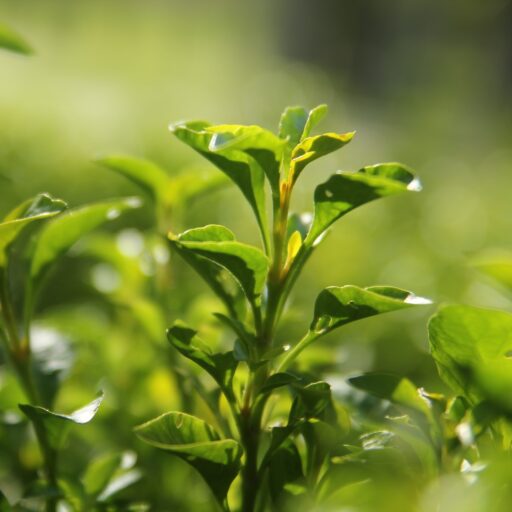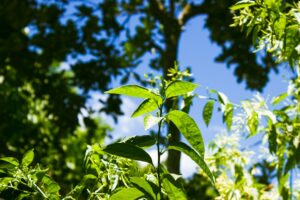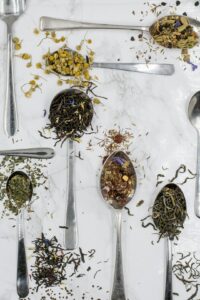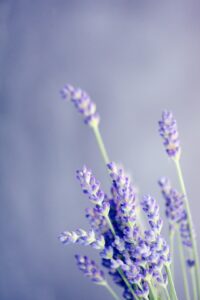Support our educational content for free when you purchase through links on our site. Learn more
[2023] What Plants Go in a Tea Garden? Discover the Perfect Ingredients for Your Brew
Is there anything more refreshing than a glass of iced tea on a hot summer day? Imagine being able to step out into your own garden and pluck the fresh herbs and flowers needed to make your favorite brew. Creating a tea garden is not only a delightful and aromatic addition to your landscape, but it also provides you with an abundant supply of ingredients for homemade herbal teas. In this article, we will explore the plants that are perfect for a tea garden, providing you with a comprehensive guide to growing your own tea ingredients. So grab your gardening gloves and let's get started!
Table of Contents
- Quick Answer
- Quick Tips and Facts
- What Plants Go in a Tea Garden?
- How to Plant a Tea Garden
- FAQ
- Conclusion
- Useful Links
- Reference Links
Quick Answer
To create a tea garden, you'll need a variety of plants that offer different flavors and aromas. Some popular choices include:
- Camellia sinensis (Tea Plant): The leaves of this plant are used to make traditional teas like green, black, and oolong.
- Mentha spp. (Mint): Mint leaves add a refreshing and cooling flavor to teas.
- Lavandula angustifolia (Lavender): Lavender flowers are known for their calming properties and can be used to make soothing herbal teas.
- Matricaria chamomilla (Chamomile): Chamomile flowers are commonly used to make relaxing and sleep-inducing teas.
- Melissa officinalis (Lemon Balm): Lemon balm leaves have a citrusy flavor and are often used in herbal teas for their calming effects.
These are just a few examples, and there are many other plants that can be grown in a tea garden. Let's dive deeper into the world of tea plants!
Quick Tips and Facts
Before we delve into the specific plants for your tea garden, here are some quick tips and facts to keep in mind:
- Sunlight: Most tea plants thrive in full sun or partial shade, so choose a location in your garden that receives at least 4-6 hours of sunlight per day.
- Soil: Tea plants prefer well-draining soil with a slightly acidic pH level between 5.5 and 6.5. If your soil is alkaline, you can amend it with organic matter or use containers filled with acidic potting soil.
- Watering: Tea plants require regular watering, especially during dry periods. Keep the soil moist but not waterlogged to prevent root rot.
- Harvesting: When harvesting leaves or flowers for tea, choose young and tender parts of the plant. This will ensure the best flavor and aroma in your homemade brews.
Now that you have a general idea of what it takes to create a tea garden, let's explore the specific plants you can grow.
What Plants Go in a Tea Garden?
A tea garden can be a diverse collection of plants, each offering its own unique flavors and aromas. Here are some popular plants to consider for your tea garden:
1. Camellia sinensis (Tea Plant)
Camellia sinensis, also known as the tea plant, is the ultimate star of any tea garden. This evergreen shrub is native to East Asia and is the source of all traditional teas, including green, black, and oolong. There are several varieties of Camellia sinensis, each with its own distinct flavor profile.
- Flavor: The flavor of tea made from Camellia sinensis leaves can range from delicate and grassy (green tea) to bold and robust (black tea).
- Growth: Tea plants can grow up to 6 feet tall and wide, making them an excellent choice for hedges or privacy screens.
- Care: Tea plants prefer well-drained soil and partial shade. They can tolerate a wide range of temperatures but may require protection from extreme cold or heat.
Shop Camellia sinensis on Amazon: Check price on Amazon
2. Mentha spp. (Mint)
Mint is a versatile herb that adds a refreshing and cooling flavor to teas. There are many different varieties of mint, including peppermint, spearmint, and chocolate mint, each with its own unique taste.
- Flavor: Mint leaves have a refreshing, slightly sweet flavor with a hint of menthol.
- Growth: Mint is a fast-growing herb that spreads quickly. It's best to grow mint in containers or confined areas to prevent it from taking over your garden.
- Care: Mint thrives in moist soil and partial shade. Regular pruning will help keep the plant compact and prevent it from becoming leggy.
Shop Mint Plants on Amazon: Check price on Amazon
3. Lavandula angustifolia (Lavender)
Lavender is not only prized for its aromatic flowers but also for its culinary uses. The flowers of Lavandula angustifolia can be used to make soothing herbal teas with a delicate floral flavor.
- Flavor: Lavender flowers have a sweet, floral taste with hints of citrus and mint.
- Growth: Lavender is a drought-tolerant perennial that thrives in well-drained soil and full sun.
- Care: Prune lavender plants regularly to maintain their shape and promote bushier growth. Avoid overwatering, as lavender prefers dry conditions.
Shop Lavender Plants on Amazon: Check price on Amazon
4. Matricaria chamomilla (Chamomile)
Chamomile is a popular herb known for its calming and sleep-inducing properties. The flowers of Matricaria chamomilla can be used to make a soothing herbal tea with a mild, apple-like flavor.
- Flavor: Chamomile tea has a mild, slightly sweet taste with subtle floral notes.
- Growth: Chamomile is an annual plant that grows best in well-drained soil and full sun.
- Care: Regular deadheading will encourage continuous blooming. Harvest the flowers when they are fully open for the best flavor.
Shop Chamomile Seeds on Amazon: Check price on Amazon
5. Melissa officinalis (Lemon Balm)
Lemon balm is a member of the mint family and is known for its lemony fragrance. The leaves of Melissa officinalis can be used to make herbal teas that have a refreshing citrus flavor.
- Flavor: Lemon balm tea has a mild, lemony taste with hints of mint.
- Growth: Lemon balm is a perennial herb that grows well in partial shade and moist soil.
- Care: Regular pruning will help control the size of the plant and promote bushier growth. Lemon balm can spread easily, so it's best to grow it in containers or confined areas.
Shop Lemon Balm Plants on Amazon: Check price on Amazon
These are just a few examples of the plants that can go in a tea garden. Feel free to explore other options such as lemongrass, rosemary, or even edible flowers like hibiscus and rose petals. The possibilities are endless!
How to Plant a Tea Garden
Now that you know which plants to include in your tea garden, let's discuss how to plant them for optimal growth and flavor.
-
Choose the Right Location: Select a spot in your garden that receives at least 4-6 hours of sunlight per day. Ensure that the soil is well-drained and slightly acidic.
-
Prepare the Soil: If your soil is alkaline, amend it with organic matter or use containers filled with acidic potting soil. This will create the ideal growing conditions for your tea plants.
-
Planting: Dig a hole that is slightly larger than the root ball of your plant. Place the plant in the hole and backfill with soil, gently firming it around the base of the plant. Water thoroughly after planting.
-
Spacing: Be mindful of the spacing requirements for each plant. Some plants, like tea plants and lavender, need room to spread, while others, like mint, are best contained in pots or confined areas.
-
Watering: Tea plants and other herbs generally prefer consistent moisture. Water them regularly, especially during dry periods, but avoid overwatering, as it can lead to root rot.
-
Mulching: Apply a layer of organic mulch around your plants to help retain moisture and suppress weeds. Mulching also helps to regulate soil temperature.
-
Pruning: Regular pruning will help maintain the shape and size of your plants. It will also encourage bushier growth and prevent legginess.
Remember, growing a tea garden is an ongoing process. Be patient, observe your plants, and make adjustments as needed to ensure their health and vitality.
FAQ
What plants do I need for a tea garden?
To create a tea garden, you'll need a variety of plants that offer different flavors and aromas. Some popular choices include Camellia sinensis (Tea Plant), mint, lavender, chamomile, and lemon balm. These plants will provide you with a diverse range of ingredients for homemade herbal teas.
What plants can you use in tea?
There are numerous plants that can be used to make tea. In addition to the plants mentioned above, other options include lemongrass, rosemary, hibiscus, rose petals, and many more. Experiment with different combinations to discover your favorite flavors.
How do you plant a tea garden?
To plant a tea garden, choose a location that receives adequate sunlight and has well-drained, slightly acidic soil. Prepare the soil by amending it with organic matter or using containers filled with acidic potting soil. Dig holes slightly larger than the root balls of your plants, place the plants in the holes, and backfill with soil. Water thoroughly and provide regular care, including watering, mulching, pruning, and monitoring for pests or diseases.
What flowers can you put in tea?
Several flowers can be used to make tea, including chamomile, lavender, rose petals, hibiscus, and calendula. These flowers add fragrance, flavor, and visual appeal to your homemade teas.
Conclusion
Creating a tea garden is a delightful and rewarding endeavor. By growing your own tea plants and herbs, you can enjoy the freshest and most flavorful homemade teas. From the classic flavors of Camellia sinensis to the soothing qualities of chamomile and lavender, there are endless possibilities to explore. So why not start your tea garden today and embark on a journey of aromatic bliss? Cheers to a cup of tea that's truly your own!
Useful Links
- Shop Tea Plants on Amazon
- Shop Mint Plants on Amazon
- Shop Lavender Plants on Amazon
- Shop Chamomile Seeds on Amazon
- Shop Lemon Balm Plants on Amazon
- Growing Teas™









